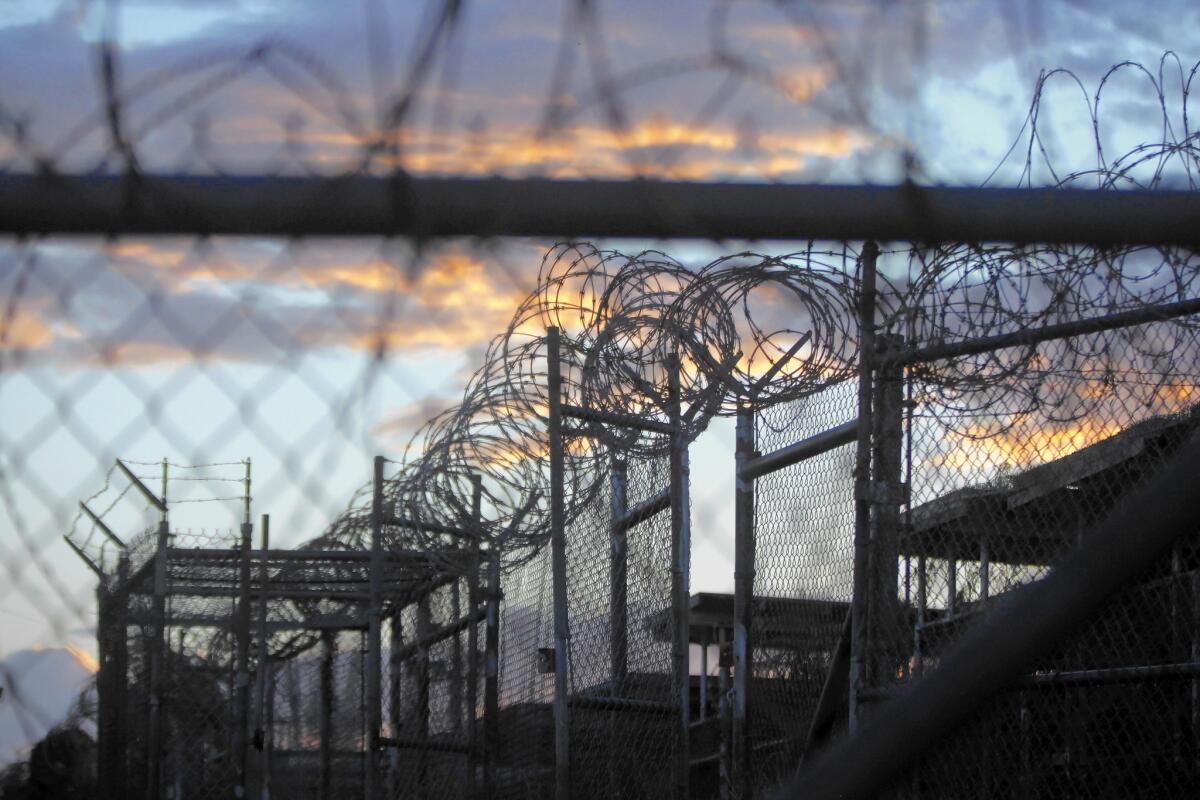Pentagon is on the hunt in U.S. for Guantanamo replacement

The U.S. military prison at Guantanamo Bay, Cuba.
Reporting from WASHINGTON — The Pentagon is sending evaluation teams to assess several military and federal prisons as possible replacements for the detention facility at Guantanamo Bay, Cuba, but Congress appears determined to prevent President Obama from closing the controversial facility for suspected terrorists before he leaves office.
One team will visit the U.S. Naval Consolidated Brig in Hanahan, S.C., next week to see whether it is a viable option to hold some of the 116 suspects still at Guantanamo, and to stage military tribunals. Several accused terrorists, including “dirty bomb” suspect Jose Padilla, were held in the Navy brig pending their federal trials.
Last week, a six-member team visited the U.S. Disciplinary Barracks, a correctional facility at the Army’s Ft. Leavenworth in Kansas. It is the military’s only maximum-security prison on U.S. soil.
The latest push to close the detention camp, which was built after the Al Qaeda attacks of Sept. 11, 2001, follows Obama’s renewed calls on Congress to lift restrictions that block detainee transfers, and to designate a U.S. site where inmates can be prosecuted in military commissions.
The Defense Department is trying to create a plan that could win support in the Senate, where John McCain (R-Ariz.), chairman of the Armed Services Committee, has indicated tentative support for closing Guantanamo if he is convinced the administration can ensure security.
“Individuals from across the political spectrum have recognized that this facility should be closed, and we look forward to working with the House and the Senate to move toward closure,” Cmdr. Gary Ross, a Pentagon spokesman, said Monday.
NEWSLETTER: Get the day’s top headlines from Times Editor Davan Maharaj >>
Pentagon officials said the evaluation teams would assess the cost of holding detainees at prisons in Kansas and South Carolina, building housing for military police and other staff, and constructing special courts.
“We are going to work through these cost assessments and put the finishing touches on it,” said Capt. Jeff Davis, a Pentagon spokesman.
Senior lawmakers in Kansas and South Carolina remain fiercely opposed to relocating detainees to their states, however, and opposition in the Republican-led Congress appears overwhelming. Obama first sought to close Guantanamo in 2009, and Congress has repeatedly voted since then to withhold money for transfers or releases.
“Congress has consistently stopped Obama by law from moving a single detainee to the U.S.,” Sen. Pat Roberts (R-Kan.) said in a statement. “Not on my watch will any terrorist be placed in Kansas.”
Sen. Tim Scott (R-S.C.) called it “unbelievable that the president believes they need to assess whether the Naval Brig, which is right next to an elementary school and a residential neighborhood … is a better option for housing dangerous terrorists than Guantanamo Bay.”
Those still in custody include 52 detainees whom U.S. military and intelligence officials have approved for repatriation or transfer abroad, and 64 — including purported Sept. 11 mastermind Khalid Shaikh Mohammed — deemed too dangerous for release. His case is going through the tribunal process.
SIGN UP for the free Great Reads newsletter >>
When the Pentagon began the current review, it looked again at the Thomson Correctional Center, a prison in northwest Illinois that was considered for transfers in Obama’s first term. But officials learned that the Justice Department, which purchased the near-empty prison in 2012, had pledged to Congress that no Guantanamo detainees would be housed there.
Opponents argue that no U.S. facility is as secure as the offshore site in Cuba. The administration notes that dozens of dangerous terrorists have been convicted in federal courts and securely incarcerated on U.S. soil. The Federal Bureau of Prisons is compiling a list of such nonmilitary prisons that could serve as detention sites, officials said.
Guantanamo has held 780 terrorism suspects since 2002. A total of 655 were released or transferred to custody of other nations. Just eight men were tried and convicted of war crimes, and only three of those are still serving time at Guantanamo.
Some released detainees later joined militant groups and participated in attacks in Afghanistan and elsewhere. Republican lawmakers contend the recidivism rate is as high as 30%, but the Obama administration rejects that figure as far too high.
In his State of the Union address this year, the president argued that Guantanamo not only serves as a rallying cry for militant groups abroad, but has grown increasingly expensive to maintain as the number of detainees steadily shrinks.
“It makes no sense to spend $3 million per prisoner to keep open a prison that the world condemns and terrorists use to recruit,” Obama said. “It is not who we are. It is time to close Gitmo.”
ALSO:
First female soldiers to graduate from elite Army Ranger school
U.S. wildfires scorch land at dramatic rate, but then there’s the Alaska factor
More to Read
Sign up for Essential California
The most important California stories and recommendations in your inbox every morning.
You may occasionally receive promotional content from the Los Angeles Times.











